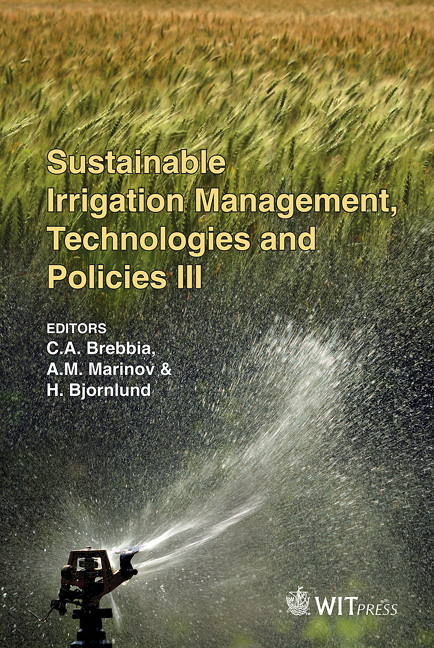Farmers’ Preferences For Irrigation Water Demand Management Tools: A Bayesian Analysis Of Choice Behaviour Of Farmers In Krishna River Basin, India
Price
Free (open access)
Transaction
Volume
134
Pages
12
Page Range
27 - 38
Published
2010
Size
342 kb
Paper DOI
10.2495/SI100031
Copyright
WIT Press
Author(s)
P. Chellattan Veettil, A. Frija, S. Speelman, J. Buysse & G. van Huylenbroeck
Abstract
Policy designers have various water demand management (WDM) strategies to achieve efficient water use and allocation at their disposal, such as setting the price of water, decentralizing irrigation water management or improving the quality of water rights. Interestingly, most of these strategies have been applied individually without focusing on the relations between them. This paper uses a discrete choice model to analyse the scope for and the farmer’s acceptance of combinations of irrigation WDM tools. In terms of local irrigation water governance the presence or absence of collective irrigation water management among farmers in the form of water user association (WUA) is considered. Water rights are specified by the duration of the title, by their transferability and by the quality of title. Finally, four types of water pricing methods (area, crop, quota and volumetric pricing) are selected for the experimental design. Using the choice experiment we can elicit the most preferred water pricing method under different water rights, water prices and local irrigation water governance contexts. Our results indicated that under conditions of improved water rights, preference for volumetric pricing increases, while the presence of a WUA decreases this preference. We also showed that making the right combination of WDM tools considerably increases the willingness to pay for a change in scenario. Keywords: complementarity, water pricing method, water rights, local water governance, choice experiment, willingness to pay.
Keywords
complementarity, water pricing method, water rights, local water governance, choice experiment, willingness to pay





